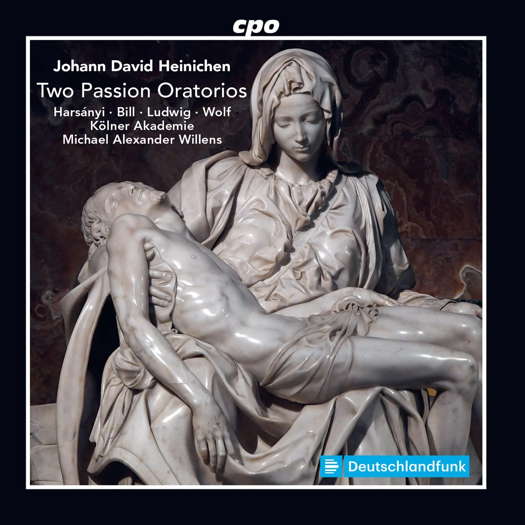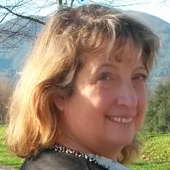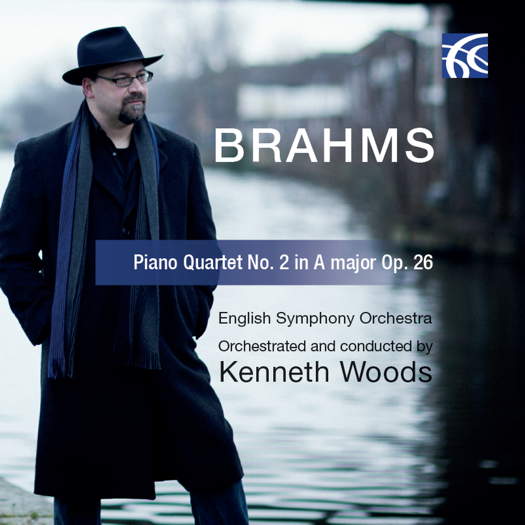- Byrd
- The Jet Whistle
- Polish Royal Chapel
- Purcell: Rejoice in the Lord Alway
- BBC National Orchestra of Wales
- Orchestra Hall Minneapolis
- Shaked Evron
- Giuliano Mazzini

Sorrowful Magnificence
GERALD FENECH is impressed by Johann David Heinichen's Passion Oratorios
'... engrossing performances that are as gripping as they are reverential.'
Johann David Heinichen was born in the small village of Krossuln, currently part of the town of Teuchern in Saxony-Anhalt, on 17 April 1683. His father Michael had studied at the celebrated Thomasschule in Leipzig and was pastor of the village church. The young Johann was also a student at the Thomasschule, and among his teachers one finds the eminent Johann Kuhnau. Heinichen enrolled in 1702 to study law at Leipzig University, and by 1706 he succeeded in qualifying as a lawyer. He practiced this profession until 1709, when he decided that music was his real vocation.
In 1710 he published the first edition of his major treatise on the thoroughbass. He went to Italy and spent seven formative years there, mostly in Venice, where he had great success, particularly as an opera composer. One of these stage-works, Mario, was even staged in Hamburg in 1716 with the German title 'Calpurnia oder die romische Grossmut'. In 1712 he taught music to Leopold, Prince of Anhalt-Kothen, who took him as composer. Indeed, the same Prince would later appoint J S Bach as Kapellmeister at the end of 1717. In 1716, Heinichen met in Venice Prince Augustus III of Poland, and thanks to him the composer was appointed the Royal-Polish and Electoral-Saxon Kapellmeister in Dresden, where, among his pupils, one finds Johann Georg Pisandel, who later was to become one of the leading Baroque German composers of his day.
In 1721, Heinichen got married and had an only child, but gradually his health started to deteriorate. He suffered greatly in the last few years of his life, and composing became almost impossible. On 16 July 1729, Heinichen died of tuberculosis aged only forty-six, leaving behind a large number of works in practically every genre. Sadly, with his demise his music was quickly forgotten.
It was only in 1992 that his works started to be better known and appreciated, thanks to Reinhard Goebel and his Musica Antiqua Köln, who recorded a selection of Dresden Concerti, followed by the Lamentationes and Passionmusik. His sole opera for Dresden, Flavio Crispo (1720), was never performed and was not recorded until 2018.
The Passion music that Heinichen wrote for the Dresden court is a document of cultural and confessional openness of the Saxon residence, and his two oratorios on this recording are surrogates of large-scale Passion music. Come? S'inbruna il ciel, composed a year before the composer's death in 1728, is the latest of the so-called 'Sepolcri' to survive from the Dresden years.
Listen — Heinichen: Come? S'inbruna il ciel! (Come? S'inbruna il ciel! Occhi piangete!)
(555 507–2 track 1, 1:47-2:41) ℗ 2022 Deutschlandradio :
On the other hand, L'aride tempie ignude is the first Passion to survive from the same period. Both texts are by Stefano Pallavicino, who was active at the Dresden court from 1719. In the first mentioned Passion, the meditation on the Passion events refers to the experience of the earthquake that occurred immediately after Jesus's death. The description of the violent natural events gives the Virgin Mary, the beloved disciple John and Mary Magdalen the opportunity to reflect on their relationship to the Crucified Lord. The recurrent themes are those of love and affection.
Listen — Heinichen: Mio Gesù, dolce adorato (Come? S'inbruna il ciel! Occhi piangete!)
(555 507–2 track 4, 0:00-0:42) ℗ 2022 Deutschlandradio :
The meditation in the second-named Passion is designed as an allegorical play of Death (Morte) and Hope (Speranza), Divine Love (Amor Divino) and Penance (Penitenza), and follows an easily comprehensible dramaturgy. The affinity to opera seria is evident in both Passions, not only in the arrangement of the pieces, but also in the keys, gestures and instrumentation that correspond to the models familiar from baroque musical theatre. This is music of the profoundest significance and importance, simply because it celebrates the most momentous event in human history. What happened on that little hill outside Jerusalem 2000 plus years ago has been reverberating through the ages, and will keep doing so till time ceases to exist.
Listen — Heinichen: Quel core sincere sol giunge (L'aride tempie ignude)
(555 507–2 track 30, 4:53-5:53) ℗ 2022 Deutschlandradio :
Michael Alexander Willens, the soloists and his Kölner Akademie deliver engrossing performances that are as gripping as they are reverential. Willens lets the music flow in all its sorrowful magnificence, and his approach is consistently devotional, eloquent, affecting. Absolutely inspirational stuff from a composer who is still waiting for that respectful recognition he so richly deserves. Superb sound quality and presentation complete a superlative issue that should not be missed.
Copyright © 27 May 2022
Gerald Fenech,
Gzira, Malta

CD INFORMATION - HEINICHEN: TWO PASSION ORATORIOS
CLASSICAL MUSIC ARTICLES ABOUT GERMANY




